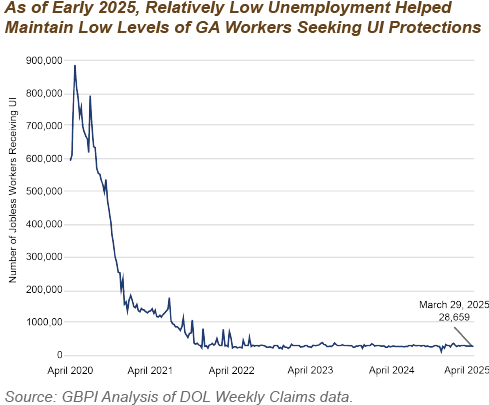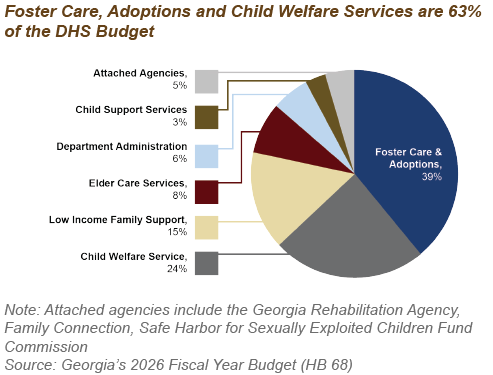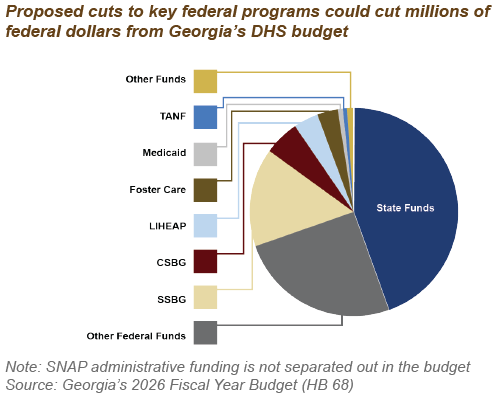Read More of the 2026 Budget Primer here.
The Georgia Department of Labor FY 2026 Budget
The Georgia Department of Labor (DOL) is an agency tasked with providing employment services for businesses and workers, workforce data and maintaining an Unemployment Insurance (UI) system.
The FY 2026 DOL budget is about $8.9 million, a $352,000, a 4% increase from FY 2025. State leaders rejected the agency’s requests for additional resources for modernizing DOL’s UI system.
The state’s low modernization investments are reflected in the DOL’s performance. In the first quarter of 2025, DOL processed first UI payments of about 74% of Georgia workers within 21 days, below the 87% federal standard.
As of early January 2025, the state’s UI Trust Fund reserve held $1.8 billion, below the federally recommended level of $3.2 billion. The time to replenish the Trust Fund is now, when UI claims are low. UI claims may accelerate in the near term due to federal budget cuts and tariffs.

The Department of Human Services FY 2026 Budget
The Department of Human Services (DHS) oversees various functions, like foster care, child welfare, support for low-income individuals and child support. The General Assembly included about $1.1 billion in the FY 2026 budget for DHS. This is 3% more for DHS than the FY 2025 budget.
Georgia spends more than 60% of its DHS budget on child welfare, foster care and adoption services, but only 15% on Low Income Family Support programs, which include the administration of programs like cash and nutrition assistance.

FY 2026 Department of Human Services Budget highlights:
- A $1.7 million increase for child welfare services for Court Appointed Special Advocates to replace federal funds deemed ineligible by the US Department of Health and Human Services
- $19.3 million for foster care for the growing costs of caring for children with complex need$6.1 million for a 2% provider rate increase for group homes and foster parents
- $5.8 million for a $3,000 pay increase for Division of Family and Children Services (DFCS) eligibility workers
Federal Funding for the Department of Human Services
Federal funding comprises 55% of DHS’ budget. It includes Temporary Assistance for Needy Families, the Supplemental Nutrition Assistance Programs (SNAP), Medicaid, Foster Care Title IV-E, Community Services Block Grant (CSBG) and the Low Income Home Energy Assistance Program (LIHEAP). Many of those programs have been named in Congressional proposals for federal cuts this year. SNAP and Medicaid could likely be cut by hundreds of billions of dollars nationally. Other proposals have suggested completely eliminating CSBG and LIHEAP.
TANF and Medicaid make up more than a fifth of DHS’ budget and fund child welfare services, foster care and adoption services, elder care services and the TANF cash assistance program. They also support the agency’s administration.

The Georgia Department of Corrections FY 2026 Budget
The Georgia Department of Corrections operates Georgia’s prison system. Over 50,000 people are living under carceral control in this system. The Georgia General Assembly approved a $1.7 billion FY 2026 GDC budget, an increase of 13% over the FY 2025 budget.
FY 2026 Department of Corrections Budget highlights:
- $50 million to support new infrastructure projects, technology and security improvements
- $44 million to provide salary increases and make job promotion system changes
- $43 million to boost marketing, training and workforce retention efforts
- $31 million to expand prison health contracts for mental, dental, physical and pharmacy services
The FY 2026 Budget Addresses Some Concerns but Ignores Others
The budget does not do enough to address the critical concerns related to the safety and well-being of correctional staff and people who are incarcerated. For example, despite more than $31 million in added prison health contracts to match a rising prison population, there is no spending added to help address unaffordable prison health co-pays that often limit incarcerated Georgians’ ability to access preventative care.
In Georgia, the number of individuals in GDC prisons is increasing again from a low of 46,000 during the pandemic to more than 50,000 in April 2025.



